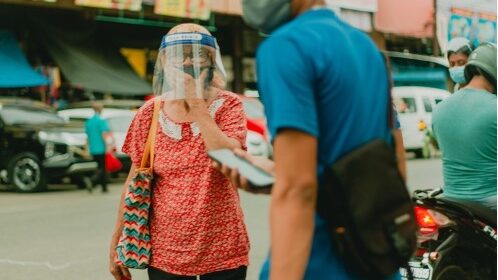COVID-19 and the Developing World
June 4, 2021

The COVID-19 pandemic has highlighted major inequalities in standards of living and access to medical care between the global north and global south. The countries Wisconsin Microfinance operates in, Haiti and the Philippines, have had incredible struggles in fighting both the medical and economic costs of the COVID-19 pandemic. These countries are continuing to deal with the harsh impacts of the pandemic, even as the United States has waned concern with the introduction of vaccines.
The Philippines has seen a huge spike in COVID-19 cases and deaths over the past three months. Rodrigo Duterte, the current president of the Philippines has continued to issue restrictions to curb the spread of COVID-19. Travel bans have been put in place from surrounding countries that also are dealing with high COVID-19 infection and mortality rates. The Philippines has the absolute second-highest number of cases and deaths in Southeast Asia. Now as a result of the pandemic and the restrictions meant to curb the spread of the virus, economic struggles have left many citizens unable to provide their families the basic necessities such as food and a safe place to live.

Haiti had minimal reporting on the status of the pandemic for a very long time because the case and mortality rates stayed incredibly low. Now, an increase in new cases has led the government to impose restrictions to curb the spread of COVID-19. This set of restrictions were the first restrictions imposed by the government of Haiti. They include a mask mandate in public spaces and a curfew in the capital city of Port-au-Prince. The increase in cases coinciding with recent major political instability has caused major concerns among international health organizations. With a lack of infrastructure and medical equipment, many public health officials fear that the number of COVID-19 cases and deaths is drastically under-reported.
Now, with the release of several COVID-19 vaccines, there has become a disparate gap between the future forecast for developing and developed countries amid the pandemic. Wealthy nations have been able to gain access to a wide variety of vaccines and inoculate citizens at rapid rates. Developing countries, on the other hand, have incredibly limited access and rely on the generosity of international organizations and wealthy nations to provide vaccines. Haiti has yet to vaccinate a single citizen, the only country in all of the Americas to not do so. The Philippines has only been able to vaccinate around 1 percent of its population. The Philippines lacks access to vaccines and many citizens have decided to not get vaccinated when offered, enabling the further spread of COVID-19. This difficulty for developing countries in accessing medical equipment and vaccines during the pandemic exposes many of global inequities that existed prior to the pandemic.
Throughout the pandemic, microloans have allowed individuals and families to build sustainable incomes that enable them to buy food, pay medical bills, and afford other necessities to sustain their livelihoods amid this global disaster. Empowering citizens and communities to develop and thrive is one of the goals of Wisconsin Microfinance and the COVID-19 pandemic has shown how important this work truly is. Our organization has historically developed programs in countries suffering from a natural disaster. The impact of the COVID-19 pandemic has a similar effect. We have begun growing our Haiti program to help address both the economic and human impacts of this new type of disaster. The need for programs like ours has never been greater.

For further research explore these sources: